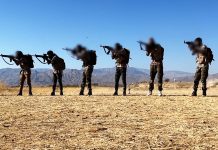Syria on Saturday welcomed the agreement reached between Iran and Saudi Arabia to reestablish diplomatic relations and reopen their embassies saying it will lead to more stability in the region – (AP)
Iran has been a main backer of President Bashar Assad’s government, while Saudi Arabia supports opposition fighters trying to remove him from power.
Iran and Saudi Arabia agreed Friday to reestablish diplomatic relations and reopen their embassies after seven years of tensions.
The major diplomatic breakthrough negotiated with China decreases the likelihood of armed conflict between the regional rivals, both directly and in proxy conflicts.
The deal was struck in Beijing amid China’s ceremonial National People’s Congress. It represents a major diplomatic victory for the Chinese as Gulf Arab states perceive the United States to be slowly withdrawing from the wider Middle East.
It also comes as diplomats have been trying to end Yemen’s lengthy conflict, in which both Iran and Saudi Arabia are deeply entrenched.
Israeli Prime Minister Benjamin Netanyahu has wanted to normalize relations with Saudi Arabia, but the deal with Iran, Israel’s arch-rival, will complicate that. It also could make Israel feel more alone if it decides to carry out a military strike against Iran’s nuclear program as it creeps closer to weapons-grade levels.
It was not immediately clear if the agreement between Saudi Arabia and Iran will help end Lebanon’s political deadlock. The country has been run by a caretaker government since President Michel Aoun’s term ended in late October.
Lebanon has been without a president since then amid deep divisions in the country’s parliament.
The powerful Iran-backed Hezbollah group said earlier this week it backs Christian politician Sleiman Frangieh to become the country’s next president but there have been reports that Saudi Arabia opposes the group’s ally to become president.
Lebanon is in the grips of the worst economic and financial crisis in its modern history. It’s rooted in decades of corruption and mismanagement by the political class that has been running the small nation of 6 million people, including 1 million Syrian refugees, since the end of the 1975-90 civil war.






























